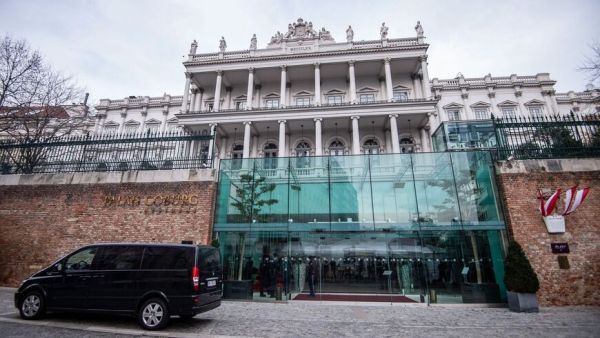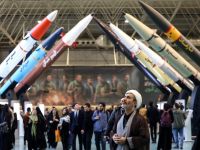If the Europeans think Iran is going to give them an easy ride on the nuclear negotiations in Vienna they are very much mistaken!
The Europeans, France, Britain and Germany know full well Iranian negotiators are tough, they play for time - and they have all the time in the world - until they squeeze the negotiations to the full limit and to their benefit.
What Iran really wants, after nuclear talks returned to Vienna—and what will happen if no deal is reached: my conversation w/ @vali_nasr, from today's GPS pic.twitter.com/FuJZSEx53R
— Fareed Zakaria (@FareedZakaria) December 5, 2021
This time around the negotiations are complicated by the fact that the United States is no longer part of the 2015 nuclear deal. The previous ex-president US president Donald Trump made sure of that when he took America out of the deal in 2018.
Under Joe Biden who won the US presidency in early 2021 the US has been trying to rejoin the deal but only with halfhearted intentions despite the foot-dragging by Iran over the past year that is mainly related to its presidential elections.
At long last negotiations started with the first round lasting five days but abruptly stopping and the delegates taking time off, travelling to their capitals for further consultations in London, Paris, Berlin, Beijing and Moscow in the P4+1 states.
The main point of contention and mainly related to the western powers is that before negotiations on nuclear developments the United States must lift its sanctions on Iran that was imposed by Trump when he got Washington out of the deal and sought to negotiate another agreement with Tehran which refused. It argued that 2015 was an iron-caste deal it negotiated in good faith and 'you can't suddenly tear up an international agreement signed with major global powers'.
Reporting from the nuclear talks in Vienna 1/2
— Richard Medhurst (@richimedhurst) December 7, 2021
Full episode: https://t.co/Fmkol6k90g pic.twitter.com/XvRcjv6Mpw
Hence, the sanctions imposed were part of the 'maximalist' tough approach that Trump adopted. Bringing Iran to its knees was thought something that would allow it to get back to the negotiating but this didn't happen with lots of years lost.
The Biden administration is adopting the same maximalist approach as that of his predecessor regardless. This could be a "no-go area" regardless of the negotiations going on in Vienna which mainly concern the powers relating to the 2015 dealer signed under president Barack Obama and relate to nuclear development, enrichment and inspection by the UN nuclear watchdog, the International Atomic Energy Agency (IAEA).
Whilst the 4+1 parties decided to stick with the deal and at one time pleaded with Iran not to scrap the agreement, dubbed the Joint Comprehensive Plan of Action, and which Tehran promised it will stick to, mainly because of political considerations, nevertheless, it began to move away from its obligations and started to slowly increase its nuclear enrichment - necessary for a nuclear bomb - and which the 2015 nuclear deal placed a cap on.
Tehran felt it had the right to adopt a flexible approach. The current US Secretary of State Anthony Blinken is of the opinion that taking the US out of the deal was "disastrous" precisely because of what happened subsequently. The Europeans may feel they same way although they tried with Iran - and maybe successfully to a degree - forcing it to stick to the agreement despite the hiccups.
China has swung its weight behind Iran, meaning the nuclear talks are not really about Iran. They
— Peter Oborne (@OborneTweets) December 3, 2021
concern the shape of the new world order emerging in the aftermath of US defeats in Iraq and Afghanistan. My report from Vienna for Middle East Eye. https://t.co/EAkDRWUcZ3
Iran sought to be 'flexible' in other ways. Under the 2015 deal the issue of monitoring was essential to keep tabs on Iran's nuclear activity. There was a process of inspection that was agreed upon and the IAEA had clinched an agreement to inspect nuclear sites in Iran. After 2018 this was largely maintained although Tehran began to drag its feet on this aspect of the deal. Starting earlier this year however, Iran placed greater restrictions on what the UN inspectors the could see and what they couldn't. This worried the inspectors even more.
So this is the situation at present as delegates prepare to go for the second round of nuclear talks in Vienna. We are yet to see how the parties will respond to Iran's initial demands of sanctions removal, but it is clear that delegates from Tehran lead by its chief negotiator Ali Bagheri-Kani is willing to "argue out" his country's case. What this means is that the world is in for a long stretch of negotiations.
Iran says Vienna nuclear talks to resume over weekendhttps://t.co/c8U8dZnuuh pic.twitter.com/aIkln1UFs5
— Yeni Şafak English (@yenisafakEN) December 6, 2021
So its early days to talk of disappointments, especially those made by European and American leaders. This is only the first round of talks and going into the second and there will likely be many other rounds down the round. This is of course, if these negotiations are not "sabotaged". Israeli leaders have said all along they are bitterly opposed to the talks with war-mongering comments about the country preparing for conflict and military strikes.
So the world is suddenly on a knife-edge. While it find itself in another potential conflict or is this just merely talk we just have to wait and see.







